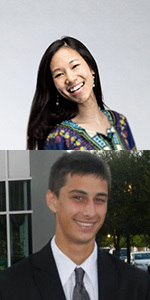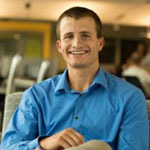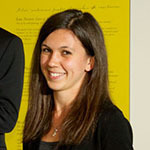
Editors Lily Kang & Ian Tembe
In February of 2016, two Flatley Center for Undergraduate Scholarly Engagement (CUSE) Sorin Scholars, Lily Kang (class of 2016, information technology management and sociology) and Ian Tembe (class of 2017, chemical engineering and philosophy) came to the CUSE offices to discuss an idea for a project — they would ask graduating seniors and Notre Dame alumni to write letters addressed to their freshman selves and would publish them in an anthology. With the support of CUSE, Dean Hugh Page and the First Year of Studies, and many other groups on campus, Ian and Lily were able to collect 65 letters to produce A Letter to My Freshman Self: Domers Reflect on their Undergraduate Experience, which was published by Corby Books in June 2016.
Two of the published letters spoke specifically about CUSE. The student authors, Michael Kochanski (class of 2013, mechanical engineering and political science) and Grace Meikle (class of 2014, Chinese and physics, Glynn Family Honors Program and Sorin Scholar), along with the editors and the publishers, have agreed to let us share them with you today.
For more information on the Flately Center for Undergraduate Scholarly Engagment (CUSE), visit cuse.nd.edu.
Dear Mitch,
Welcome to Notre Dame. Welcome home.
You are in for it, man. Best five (spoiler alert) years of your life are on deck. Well, best years so far, anyway…being an adult is a good time too. But let future Mitch enjoy that.
Everything all these happy people have been shouting at you about Notre Dame is true: you will receive an outstanding liberal arts education, experience community like you never have before, challenge and deepen your spiritual convictions, sharpen your sense of self and your place in this world, carve out your first step toward a meaningful career, and meet friends and mentors whose love and support will reshape your life. All of this will be yours. Not even you can screw this up! All you have to do is follow the signposts and make a habit of saying “yes.” Notre Dame is pretty good at delivering a transformational experience to its undergrads without requiring a great deal of creativity or initiative on their part.
There may just be two exceptions. That is, there are two things that you might miss if you were to just go through Notre Dame on auto-pilot. So let me flag those for you.
First, quickly: invest in friendships with classmates who are not straight white upper-class legacy Catholic business majors from the Chicago suburbs. These folks are a blast, don’t get me wrong, and you will have no shortage of such friends. But you have to go out of your way to authentically experience diversity at Notre Dame. Do yourself a favor, starting today, and set forth with purpose on the lifelong human project of deconstructing the illusion of “otherness” by seeking out and investing in relationships with people who are different from you.
Second, at greater length: there are faculty and staff in every building on this campus that want to pay you to do cool things. Let me get more specific. They want to fully fund you to design and live whatever kind of immersive, challenging, enriching learning experience that your beautiful, ambitious imagination can conjure up. They want you to build a footbridge in Nicaragua, join a materials engineering lab in New Zealand, write the growth strategy for a social enterprise in Buenos Aires, and backpack the way of St. Francis in Italy. These Notre Dame faculty and staff (and the rich people who give them lots of money to give to you) want all of this for you, so badly. It is absurd.
One day it will be part of your day job to convince Americans with irrational gobs of wealth that they should be giving to highly effective social change organizations rather than their alma maters. Assuming that, by the time you read this, my colleagues and I have made little progress on this front, I encourage you to take advantage.
I can just hear you now: “Holy cow—how do I tap into this bottomless pit of funding for my personal and professional growth?” Unfortunately, there is no sign-up sheet. You have to go after it yourself. You have to be entrepreneurial: you need the vision and motivation to create something of value in circumstances where nobody is telling you when or how to do it. Sourcing Notre Dame-funded projects requires the same entrepreneurialism your roommate will exhibit when he establishes your friends’ annual tradition of suiting up and eating dinner at St. Mary’s: you’ve got a crazy idea, and nobody has asked you to do it, but nobody has told you that you can’t; you decide to give it a try, and it turns out Notre Dame will pay for it; the first time is pretty awkward, it doesn’t go so well in practice, but you know you like the idea of it, so you keep trying; eventually a group of people circles up behind you to make it work, and it changes your life forever. I swear to you, we are talking about the same thing. Entrepreneurialism.
No one is going to tell you when or how to design a unique experience for yourself; that’s why your peers on autopilot spend their summers in corporate internships rather than foreign countries. There is no assignment, or set of bullet points to memorize, and nobody is going to hand you a step-by-step checklist on “How to become an Notre Dame-funded experience entrepreneur.”
Until today.
1. Start early, plan ahead. It takes more than a couple days (or weeks) to develop the relationships and incubate the ideas you need for a good project proposal.
2. Familiarize yourself with the campus institutes and departments that have funding for undergraduates. CUSE (Go walk into CUSE tomorrow. Seriously. Walk in and start talking to someone. Trust me), the Career Center, Nanovic, Kellogg, the Center for Social Concerns, Gigot… the list goes on. Sign up for their newsletters.
3. Cultivate interests. Irish language. Catholic social teaching. Obscure sporting traditions. Beer. The bar is low, seriously. Sorry if this one is too obvious.
4. Translate interests into ideas. What sort of experience could deepen my relationship with this interest? Create the conditions for ideas to surface: break from routine, brainstorm, bounce ideas around with friends, peers, and professors. Look to others, and the internet, for inspiration.
5. Seek out mentors. They will introduce you to opportunities you couldn’t possibly read about or find online. Go to office hours, get in line after a lecture, send a cold email to someone you’ve heard is interesting. Finding a good mentor is like finding a girlfriend: it’s a numbers game, and you’re gonna have a lot of awkward conversations before you find the right one.
6. Get input early and often. Engage the folks at the department where you will be applying for funding. Share your ideas, share your drafts. They will help you refine your concept. This can only help your odds of being approved.
Okay, that’ll do. Stepping off the soapbox now.
Have fun, go get ‘em, I’m jealous,
Future Mitch

Mitch Kochanski '13, Political Science and Mechanical Engineering
Mitch grew up in the Chicago suburbs before starting at Notre Dame and moving into Stanford Hall, where he would live alongside a group of the biggest goofballs whom he feels blessed to call friends and mentors. While at Notre Dame, Mitch studied political science and mechanical engineering as part of the Reilly Dual-Degree program, worked in Nicaragua as part of NDSEED/ISSLP, studied abroad in London, gained summer work experience in New Zealand and Argentina with CUSE support, wrote his thesis on the Alliance for Catholic Education, and was a two-time Rec Sports broomball champion. Upon graduating he entered a consulting role at The Bridgespan Group, a nonprofit advisor and resource for mission-driven organizations and philanthropists committed to breaking cycles of intergenerational poverty. He now lives in San Francisco, where he spends his January mornings surfing at Ocean Beach and reminiscing fondly upon South Bend winters.
Dear Freshwoman Grace,
Let me introduce myself: I was the first person in my family to go to Notre Dame. I majored in physics, Notre Dame class of ‘14. I worked in Professor Kamat’s lab researching solar cells during the school year and I did three international research internships in India, Japan, and China during my undergraduate summers. I also completed a second major in Chinese. Since graduating I’ve been working on rigs in the oil sands in Alberta, Canada. I am an alumni of Breen-Phillips Hall.
You are about to begin a big adventure. Here is some advice I’d give to you if I could go back to my freshman year at Notre Dame:
Take advantage of being a student. When you’re a student, everyone wants to help you and assumes your intentions are innocent. You can literally cold call (or email) a company, say you’re working on a class project, ask them questions about what they do—and 9 times out of 10, they will help you. Good luck trying that after you’ve graduated! I did exactly that for a project in my Entrepreneurship class. I connected with an employee at the company who told his boss about my project. The company later ended up offering me a job. Who knew?!
Don’t take your romantic relationships too seriously. As freshman I spent a lot of time being distracted by my relationships. I even pictured myself getting married in a couple of years. In retrospect, I was holding myself back. That’s not to say you shouldn’t date. But as a Notre Dame student, you have a huge opportunity to better YOURSELF. Trust me, 18-22 is way too young to settle down, mentally or otherwise. You will (and should) change during college and even more so after graduating! If there really is that special someone in your life...well, for the time being, it’s more valuable to keep that person as a trusted friend than an estranged ex.
Get experience. Then expand on every experience as far as you can. Take advantage of Notre Dame $$$. Get work or research experience over spring break, summer—whatever you can get your hands on. Then, even if it doesn’t go as wonderfully as it could have, write a paper on what you did and apply to get it published in Scientia (or an equivalent campus journal). Also apply to present your work at a conference, and don’t be afraid to think nationwide. I presented at NCUR (National Conference for Undergraduate Research) and the University of Nebraska’s Women in Physics Conference. In both cases I applied for and received funding from CUSE (Flatley Center for Undergraduate Scholarly Engagement). At Notre Dame, you have a wealth of funding programs at your disposal. If you treat your funding application as seriously as you treated your college application, you will likely get results.
It’s okay if your freshman year is tough academically. There’s nothing wrong with changing your major, but don’t give up right away. In the first semester of my freshman year, I enrolled in Honors Calculus even though I had never taken calculus before (I would not advise this). I also had a world of trouble in Gen Chem, since I’d never taken chemistry before either. In those classes I felt stupid all the time and had no idea what was going on (Note: if you experience this, you are NOT the only one). Looking back, I cannot emphasize enough the importance of going to office hours! It took me way too long to catch on to that. Thanks to the encouragement of my parents and professors (and my awesome First Year Advisor, Dr. Ken DeBoer), I stuck with my major. Around the end of sophomore year a funny thing happened: my classes got a lot harder for everyone, not just me, and I actually had an advantage because I was already used to being challenged.
Break outside of your comfort zone. For one, invest yourself in South Bend. You are going to spend four years here and you need to make the effort to leave the bubbly comforts of campus at some point during your undergraduate career. There are lots of ND programs that will get you into town even if you don’t have a car – whether volunteering to teach English to South Bend residents through Catholic Charities, helping with the annual “Science Alive” event at the public library, or taking a class at the local prison (my roommate did this). You don’t have to be an international student to go to ISSA events; and you don’t have to consider yourself LGBTQ to go to PrismND meetings. Go to “Show Some Skin” even if you have never experienced racism yourself. If, like me, you aren’t Catholic, go to your dorm Mass once in awhile anyway, get involved in your dorm, and consider applying to become an RA senior year. If you do, you might even get in a fight with a nun (I hope Sister Mary forgives me because I still feel bad for yelling at her). Remember, the more you broaden your perspective, the more you have to contribute to the Notre Dame community and the world. I truly believe this.
I hope this helps you! Good luck. Feel free to contact me any time for advice. Go Irish!
Sincerely,
Grace Meikle

Grace Meikle '14, Physics and Chinese
Grace Meikle grew up between the US, Japan, and Taiwan. She was the first person from her family and from her school to attend Notre Dame. She majored in Physics with a second major in Chinese. During university she researched solar cells in Dr. Kamat's lab, interned at an off-grid solar company and participated in two NSF fellowships in Japan and China. On campus, she participated in ISSA as an International Student Ambassador and was an RA for her dorm, Breen-Phillips Hall. After graduating in 2014, she worked for Schlumberger oilfield services in Alberta, Canada as a Wireline Engineer. Currently she is about to begin a new position as a Product Engineer for Micron Technology, a semiconductor manufacturer based in Boise, Idaho.
These letters were originally published in A Letter to My Freshman Self: Domers Reflect on Their Undergraduate Experience in June 2016. The book is an anthology of 65 personal letters from University of Notre Dame alumni ranging from the graduating classes of 1957 to 2016 addressed to their freshman selves. Two Sorin Scholars led a team of Notre Dame undergraduate students to bring this book to life. You can purchase a copy of the book on Amazon or learn more about it on its website. All proceeds support a scholarship for incoming freshmen at Notre Dame.